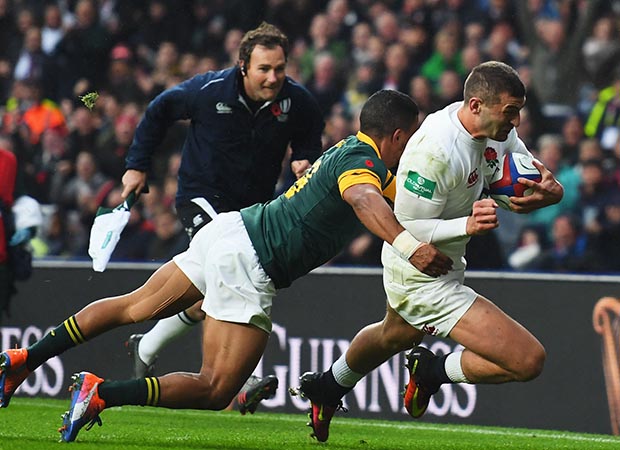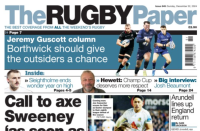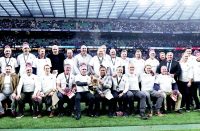 After a ten-year wait England have finally laid the Springbok ghost to bed with a resounding win by 37 points, including four tries, to 21 points with two tries. Exciting as it was for us England fans, the standard of play was appallingly average with the Springboks‘ performance the worst I have seen them play.
After a ten-year wait England have finally laid the Springbok ghost to bed with a resounding win by 37 points, including four tries, to 21 points with two tries. Exciting as it was for us England fans, the standard of play was appallingly average with the Springboks‘ performance the worst I have seen them play.
In the one area where they were at least competitive (the scrum) the referee Jérôme Garcès failed to reward their efforts, penalising the Boks as the scrum collapsed after reforming when the England pack had been blown away in the previous scrum.
The organisation and execution of even the simplest game-plan seemed beyond the Boks, as they struggled to show any of the pride, passion and power which is usually their rugby trademark.
Despite the old adage, “you can only play what’s in front of you”, the England team failed to dominate as they should have, only moving the ball through the hands once with any purpose. Scoring a simple try straight from a lineout against a defence so disorganised Jonny May probably couldn’t believe his luck.
The schoolboy errors at the break-down which allowed Ben Youngs to twice dummy and run through a gap wide enough for a bus, to set-up tries for Farrell and Ford, more or less summed up what was a poor spectacle for any neutrals in the sell-out crowd.
The good news is that England will get better as they rediscover the togetherness they had during the Six Nations and on the summer tour as they play and train together over the next three weeks.
With more players getting the chance to stake a claim in Eddie’s England dream this week and next, the future of England is looking good enough to challenge the All Black record-breaking unbeaten run.
South Africa, however, are a different story with the team seemingly on a slippery slope with no clear way to change direction back to winning ways.
When Nelson Mandela pulled on the Springbok shirt at the start of the 1995 World Cup, he reconciled and united his country in a way no one thought possible.
The fears that pervaded the minds of all South Africa’s diverse people were dispelled and a new confidence inspired the nations as the South African team went on to win the Cup.
Over the years all sport in South Africa had divided on racial lines with blacks mainly playing football and whites playing rugby and, although there were some coloured players in rugby clubs around the Cape, virtually none played in clubs in the high veldt.
While the reverse is true in football, only rugby has had a quota system imposed on it, eroding the unity that Mandela had sought to foster by wearing the Springbok shirt.
All the pathways guiding young players through their development in all sports take time to change and break the bonds that encourage children to follow a particular sport and even more time to develop those that show potential into international players.
The forced selection of players that all know are not of international standard undermines the confidence of all the players and the morale of the squad and its supporters while discouraging young players from taking part in an unfashionable and failing sport.
If ever evidence was needed that politicians should stay out of sport, a look at South Africa’s results since being forced to change the selection policy to include specific quotas of each race should provide enough to convince all.
Last Sunday, Don Rutherford, the Rugby Football Union’s first ever technical director, sadly died at the age of 79.
Don was the man every England fan should thank for the team’s successes over the decades, including the Grand Slams of the Nineties and the World Cup win in 2003.
Don was technical director at the RFU for 30 years during which time he started many new schemes to help make the game function better, including referee and coaching development pathways.
On the playing front, Don was a man of vision who brought new techniques and training methods to the game in England and changed the way that teams prepared and analysed games by introducing video analysis of games and individual performance, long before other nations.
He pioneered athletic training methods, moving players out of the comfort zone and changing the fitness levels of all, not just the England teams.
As well as being innovative, Don brought best practice from around the world of rugby and other sports and disseminated it throughout the English game with coaching manuals and videos.
He was also the man who suggested the appointment of England’s most successful coach, Geoff Cooke and suggested that I appoint Clive Woodward as my U21s coach to give him experience of the international game.
In 1999 he was forced out of his post by new CEO Francis Baron and replaced by three new directors taking on various sections of the work that Don had done alone.
Before all that Don was a player, who like me, played for a lot of clubs. He also played for England, earning 14 caps, the Barbarians and the Lions.
Rest in peace Don, England Rugby owes you a great debt.























